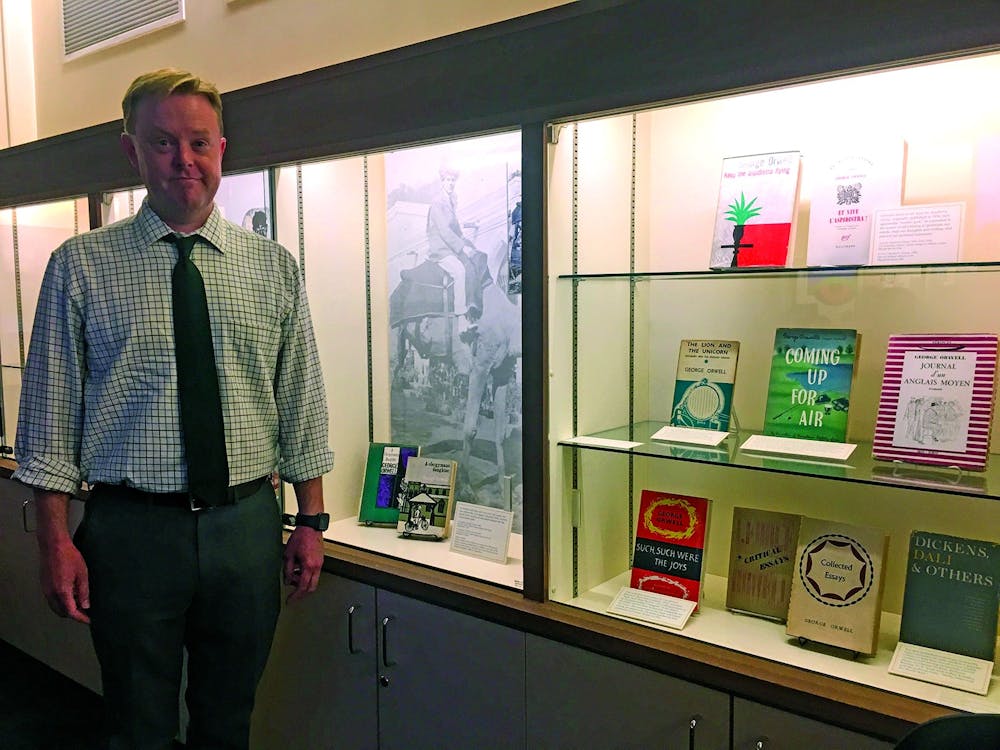ZIMMERMAN — Food is not normally associated with the writings of George Orwell, but his controversial way of offending people with the truth can even be found in his British cooking reviews.
Caleb Richardson, a British history professor, gave a "George Orwell and Food" presentation Thursday, Feb. 20 as part of the New Mexico People and Places series in Zimmerman Library. The lecture was held in the Frank Waters room in conjunction with the "George Orwell, His Enduring Legacy" exhibit. The exhibit includes over 600 works of Orwell's donated by retired University of New Mexico professor and curator emeritus Russ Davidson.
Before the lecture series was organized last fall, Davidson created a catalog for the English writer Orwell. He asked Richardson to write an essay about something related to Orwell's written works, and Richardson said he was happy to work on the project. However, in an effort to tread unresearched territory, he fell upon the topic of food.
"He's associated with much more sort of world shaking things like war and revolution and politics and cold war," Richardson said. "A lot of his most personal writing is all food — he was very interested in food, very interested in cooking, and I think that provides a window into him that some of his other work does not necessarily."
Richardson's presentation focused on multiple different essays written by Orwell about food. One of his first recognized British food essays was called "British Cookery," which Richardson said displayed Orwell's well-known quality of annoying people with his words.
Orwell was commissioned by the British Council to write "British Cookery" in 1946, shortly after he had written an essay called "In Defense of English Cooking" where he praised certain types of British food. One of his most famous books, "Animal Farm," was published in 1945, causing his writing to receive a lot of attention for this new food review.
"If he had published 'In Defense of English Cooking' a year earlier, people who were interested in food would have asked 'Who is George Orwell?'" Richardson said. "But at the end of 1945, people were asking 'Why is George Orwell writing about food?'"
Richardson said one of the most interesting things he learned while researching this topic is that the British Council asked Orwell to write "British Cookery" thinking he would write something similar to his positive review from "In Defense of English Cooking." But they received almost the opposite when Orwell brutally bashed the entire cuisine, and they rejected the essay.
"They refused to publish it because it was too controversial — it was too negative, too critical of British food," Richardson said.
It took more than 70 years for the the British Council to release the rejection letter of Orwell's original documents. Richardson was doing research for his essay in 2019 at the same time the British Council released an apology to Orwell for the rejection of "British Cookery," which he was able to use as a main topic for his presentation.
"I wanted to hear and support the event," Davidson said. "The subject matter is of keen interest, and Professor Richardson writes beautifully. He has a very fluid writing style, and I'm sure the paper that he gives is going to be highly entertaining."
Richardson is the third and final speaker to present on Orwell as part of the exhibit, which has been on display since September of last year. Davidson worked with Tomas Jaehn, the director of the Center for Southwest Research and Special Collections, to organize the exhibit lectures and find the best people to give them.
Get content from The Daily Lobo delivered to your inbox
Daniel Ward is the culture editor at the Daily Lobo. He can be contacted at culture@dailylobo.com or on Twitter @wordsofward34






